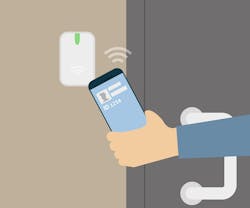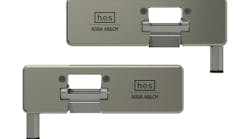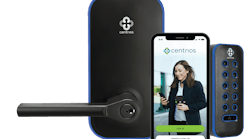Due to greatly enhanced product performance, sharp user demand for the convenience of technology, and with major cost savings as compared to hard-wired systems, we're seeing a substantial migration toward wireless locks and mobile access solutions. Offering a new level of installation and user convenience, as well as elevated features for both the users and administrators, wireless and mobile solutions, are fast becoming a driving force within the industry.
Traditionally with lock systems, there were few choices. Either install cylinder lock/brass key units, or put in a fully wired access control system. For decades, there was no middle ground; wireless locksets existed for quite some time, without any improvements to the technology.
Digital technologies now enable manufacturers to embed a significant level of intelligence within a lockset. This data intelligence allows different products to interconnect through the convenience of wireless communications. Today's wireless and mobile solutions deliver access control functionality to applications where traditional hard-wired installations were cost prohibitive.
With equipment and installation costs accounted for, a wireless lock system's total cost can be less than half that of a traditional online, wired access control system. By leveraging wireless technologies, the need for installing hard-wired power and data cabling can be significantly reduced or even eliminated in many installations. Additionally, integrated wireless locksets require significantly less power to run compared to traditional wired access control systems. Depending on the wireless technology chosen, these systems may achieve up to an 80 percent reduction in power per opening, further reducing the total cost of ownership.
The ability to provide the functions and features of online access control, at a fraction of the cost continues to catch the attention of business sectors, most notably universities and residence halls, small- and medium sized businesses, and multi-family facilities.
Extending the Coverage
Depending on a facility’s needs, there are different ways to approach a wireless/mobile lock solution.
One approach is to have a wireless lock at the door communicate to a ceiling-installed hub, with the data communication taking place via standard access control infrastructure including the panel that most are familiar with. This saves the time and expense of running wiring through the wall to the door, and enhances overall security, with no exposed cabling that may be compromised. These types of solutions can extend the coverage of existing access control infrastructure.
Other installations may not have existing security infrastructure or the desire to spend time or resources to deploy such a system. In these situations, users can leverage their existing wireless network, allowing IP-enabled locksets to speak directly to access control software, with no panel necessary. When adding locks to the system, only the cost of the lock is involved. This approach is much less expensive than adding panels or investing in panels that may be mostly underutilized.
And in today's environment for residential use, it's all about the smartphone. Our smartphones are powerful wireless devices and they are always with us — a perfect access control tool. As users grow more confident and familiar with the technology, we see residential use drive commercial interest. If wireless access works for home systems, why not incorporate it into the office? It's a natural progression of where the end user wants to go and adoption of new technologies is occurring at a much faster rate.
IP-Enabled WiFi access control systems provide benefits for both the user and the integrator since:
• WiFi uses existing infrastructure, has low cost installation with “near on-line” performance
• Eliminates the cost and complexity of deploying a proprietary security network
• Locally stores all users, schedules and holidays
• Local lockdown and privacy features integrated
Technology in Action
An excellent example of wireless and mobile access success can be seen in the university residence hall and multi-family housing markets. These facilities face many complex security challenges. Many university residence halls are looking to add auditability and security to their existing buildings. In these retrofit applications, installing hardwired security through existing walls can prove nearly impossible.
Multi-resident housing facilities are usually door-dense environments. The distribution and management of hundreds of brass keys and mechanical locksets is a far-from-perfect solution that results in either the risk of keys that are unaccounted for or the high cost and inconvenience of having to rekey locks. Mechanical key systems make it nearly impossible for property managers to manage access for tenants, employees, visitors and contractors while ensuring accountability and that only those authorized can gain access.
Thanks to wireless lock technologies, it is now possible to deploy a secure, manageable, and cost-effective solution without the need for complicated and expensive security infrastructure.
Security Beyond the Door
Wireless and mobile solutions reach far beyond a typical door opening. Server cabinets, lockers, traditional cabinets and other high-density lock applications represent tremendous opportunities for providing security beyond the door. With the advancement of wireless technologies, Power over Ethernet (PoE) convenience, and the continued overall reduction in device costs as performance increases, we're seeing a surge in the deployment of electronic locks in higher density applications. From medical facilities and law enforcement to retail and data center-type uses, end customers recognize the value of enhanced security, control, and detailed audit trails made possible with cabinet lock installations.
Electronic cabinet lock systems provide a path for security professionals to increase their business and deliver a compelling new service for their customers, enter new business segments and upgrade more openings than ever before. Additionally, there's a direct correlation between more cabinet locks, more reader licenses, and more potential repair and renewal for maintaining the actual physical control of the opening and supporting the opening after the install. Cabinet locks and electronic locker management present a significant, high-density opportunity for security and access control integrators, and a better security solution for end-users.
A Lock on Opportunity
For security dealers and integrators who service environments of most any size, a cost-effective, easy-to-deploy, and easy-to-use access management system is now attainable. The latest technology allows managers and developers to not only increase security and convenience, but to increase the value of their properties by making convenient access a marketable benefit to attract and retain residents.
With the majority of the population now relying on their mobile phones for managing nearly every aspect of their lives, mobile credentials will soon become a requirement for many customers. This drastically impacts the way that access control software is delivered. Wireless and mobile technologies offer a secure, manageable and cost-effective approach without the need for expensive infrastructure.
It's critical today that integrators embrace emerging technologies such as mobile; and products and tools that make their jobs easier, their companies more profitable, and to provide better solutions for their customers. For a meaningful understanding and utilization of new technologies, it's essential that integrators seek out and work with manufacturers that understand, embrace, and support these technologies within their solutions.
About the Author: Lisa Corte is ASSA ABLOY’s Product Manager for Wireless and IP-Enabled Solutions. Working at ASSA ABLOY since 2014, Lisa has extensive knowledge on wireless and mobile access solutions. A graduate of Binghamton University, Corte has been in the engineering field for over 14 years.






